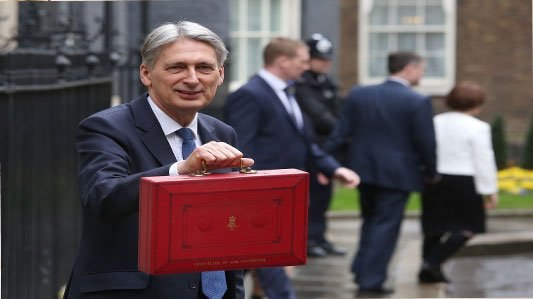In a Budget speech widely regarded as otherwise dull (and not necessarily the worse for that), the Chancellor, Phillip Hammond, has stoked political controversy by hiking up national insurance contributions for a large group of the self-employed.
His critics, including many on his own Tory backbenches, say this is a flagrant breaking of a crystal-clear pledge made in the party’s election manifesto two years ago. He is trying to claim that it isn’t, and that in any case the change makes the system fairer. If the move does break a pledge, does it matter? How seriously should we now regard other supposedly firm commitments the government has made? And what role should ‘cast-iron guarantees’ play in our politics anyway?
Mr Hammond announced on Wednesday that Class 4 national insurance contributions (NICs) would rise from 9p in the pound to 10p next year and 11p the year after. This class of NICs is paid by the self-employed; employees working for companies pay 12p and their employers contribute too. The Chancellor decided to increase what is in effect a form of income tax in order to raise revenue to pay for extra spending he pledged in order to alleviate pressures in the social care budget and to help businesses facing steep hikes in their business rates bills.
All tax increases produce squeals, of course, but Mr Hammond’s choice of where the pinch should be felt has produced an outcry of a different order. That’s because it appears to fly in the face of a very explicit commitment the Conservative Party made in its election manifesto back in 2015. The document said: ‘We can commit to no increases in VAT, income tax or national insurance.” This ‘tax lock’ commitment was repeated on four occasions in the manifesto.
But the Chancellor has refused to admit that he is breaking this promise. He claimed that when his predecessor, George Osborne, introduced legislation after the election to put the tax lock commitment into law, he explicitly referred to the ‘main’ rate of NICs (Class 1), implicitly leaving open the opportunity to raise other rates.
He went on to say that what he was doing was, in effect, dealing with an anomaly in order to make the national insurance system fairer. Previously the different rates of NICs had been justified because the benefits available to the self-employed who paid the lower rate were less generous than those available to employees, but this difference had now largely disappeared and remaining differences (on such matters as paid sick leave and parental leave) were being looked into. He added that only 15% of the workforce was self-employed and that as a result of his change, 60% of these (those earning less than £16,250) would actually pay less. Those who would have to pay more were the better-off self-employed.
His case was backed by the independent think-tank, the Resolution Foundation, whose director, Torsten Bell (a former adviser to the last Labour leader, Ed Miliband), said this action on ‘unfair and expensive tax advantages’ for higher-paid professionals was to be welcomed.
But the Chancellor’s own backbenchers were not so welcoming. Many complained that the policy hit the very people the Tory Party is supposed to support: small entrepreneurs trying to make a go of their businesses. Stephen McPartland MP said: ‘We are taxing those families who have taken on the risk of setting up their own small business, many of which employ apprentices and are the backbone of our economy.’ Andrew Murrison MP said: ‘It’s very important to ensure that we don’t disadvantage self-employed people. This party has always been and I hope always will be the party that supports white van man and white van woman.’
But it is the apparent breaking of the manifesto pledge not to raise NICs that has provoked most opposition, including on the Tory benches. Few buy Mr Hammond’s defence that his predecessor made it explicit that the pledge covered only Class 1 contributions: that was certainly not made clear in the manifesto. Even those who think the change justified are not happy, but largely because they think the pledge should not have been made in the first place. Their exasperation will have been heightened by the remark of Ameet Gill, David Cameron’s former director of strategy, that the pledge had been made at short notice before the election as a gimmick ‘to fill a vacuum’.
Whether or not enough Tory MPs will feel strongly enough to vote against the measure remains to be seen. But the government has only a slender majority of 17 and it seems only a matter of time before it is defeated on a measure it thinks of vital importance. Some are arguing that before that happens, and with the Labour opposition so out of sight in the polls, the Prime Minister should call an election in order to secure a majority against such rebellion. Lord Hague, the former Tory leader and ex-Foreign Secretary, argued the case for this only a few days before the budget.
But that would come up against another commitment, albeit not a manifesto pledge. Ever since she became prime minister, Theresa May has insisted that there would be no general election before 2020, when the law enshrining five-year parliaments requires there to be one. Downing Street repeated the commitment in response to Lord Hague. But the law does provide her with the means to engineer an earlier election, should she want one, so the ball is in her court.
Mrs May, however, seems to have gone out of her way to create the impression that she is different from many other politicians by insisting that she is a politician of her word and that what she promises can be relied upon. Such was the purpose of her early mantra, ‘Brexit means Brexit’. To go back on her commitment not to call an early election, coming after her chancellor’s apparent breaking of the national insurance pledge, would risk undermining any reputation for being straight.
To many people, keeping a pledge is vital for our trust in democratic politics. They would argue that the governed offer a mandate of trust to those who govern them and the manifesto is effectively a contract that defines the terms of that mandate. Hence the convention that the unelected House of Lords should never overturn a government policy that has been set out in a manifesto.
Others, however, regard this as a bit too purist. If Mr Hammond has indeed broken a manifesto pledge, he is hardly the first minister to do so, they say. Politicians break promises all the time and often it is necessary that they do, the argument goes, because the world is full of unexpected change and it’s the job of politicians to react as best they can. If this involves breaking an odd pledge made during an election campaign, then what does it matter if the outcome is better than if they didn’t? And who believes in the pledges in the first place anyway?
Perhaps Mrs May did indeed fully intend that her government would be one that kept its word and that her chancellor’s first Budget is an indication that it may not turn out like that. If so, does it matter?
What’s your view? Do you think the Chancellor, by raising NICs for the self-employed, did break a manifesto pledge or not? If he did, was it justified? How sacrosanct do you think the Prime Minister should regard her commitment not to hold an election until 2020? And in general, how important do you think it is that politicians should first make pledges and then stick to them?
Let us know your views.









